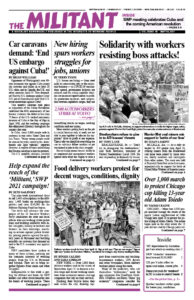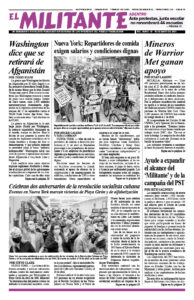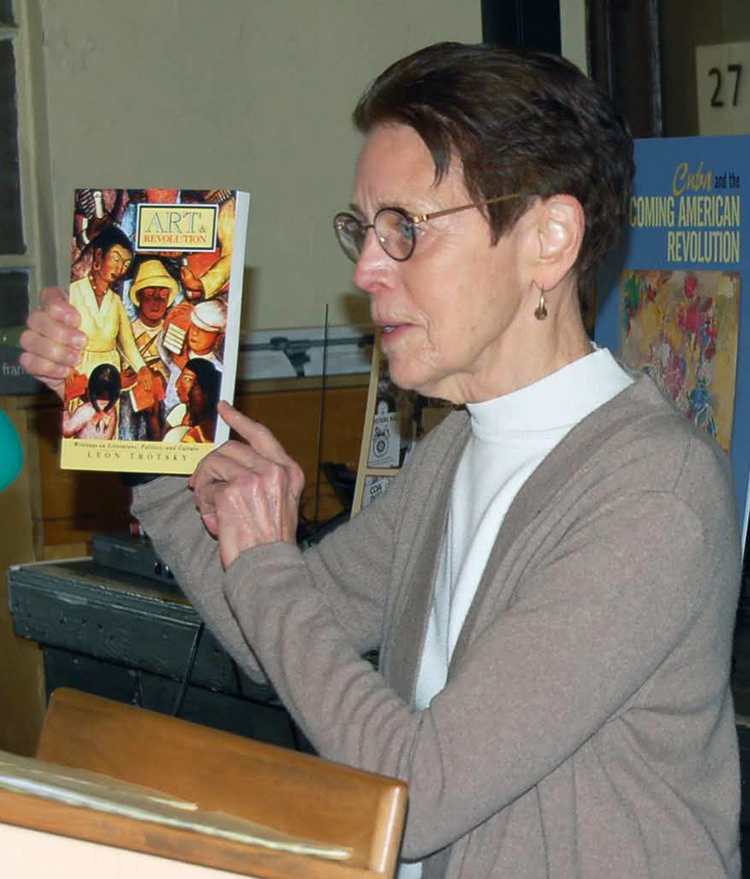
CHICAGO — “Cuba and the Coming American Revolution: The 60th Anniversary of Two Historic Victories of the Cuban Revolution and Their Significance for Building a Revolutionary Party in the United States — Then and Now” was the featured talk at the Socialist Workers Party’s Midwest conference held here April 24, presented by SWP National Committee member Mary-Alice Waters. She is also the editor of Pathfinder Press’s more than 30-book series on the Cuban Revolution, and author of a number of them.
Waters focused on how Fidel Castro, Che Guevara and other leaders of the revolution led workers and farmers in Cuba to take political power, mobilize to make deeper and deeper inroads against capitalist property relations, and transform themselves in the process. Through these mass proletarian mobilizations, the Cuban toilers carried through the first socialist revolution in our hemisphere.
She also focused on the impact that powerful revolutionary upsurge had on winning revolutionary-minded youth in the U.S. who were active in the mass proletarian Black-led battle to overturn Jim Crow segregation to join and build the Socialist Workers Party of today.
Drawing on the lessons of the Cuban Revolution, Waters also addressed the stakes for working people in the blow to our rights registered in how the capitalist rulers organized the trial of Minneapolis cop Derek Chauvin, convicted of killing George Floyd in 2020.
Some 60 people attended, including party members, supporters, co-workers and youth from Chicago, Minneapolis, Detroit, Cincinnati and Louisville, Kentucky. Also present were Joe Swanson, Socialist Workers Party candidate for City Council in Lincoln, Nebraska, and SWP candidates for mayor in Minneapolis and Louisville, Doug Nelson and Maggie Trowe.
The evening program began with a dinner, followed by the program and a rich hourlong discussion period. It ended with a social for relaxed, informal political discussion.
A fund appeal by Trowe to help advance the SWP’s national campaign raised $3,600.
The meeting was co-chaired by Dan Fein, SWP state campaign chairperson in Illinois, and Mary Martin, chairperson of the Twin Cities branch.
Revolutionary course of action
The program opened with a video preview of Maestros voluntarios (Voluntary teachers), a short documentary-in-progress about the 1961 Cuban literacy campaign. The film was provided by director Catherine Murphy.
“There is no better way to begin our program tonight than with this video,” Waters said, noting it captures the mass, working-class character of the literacy mobilizations.
“It’s great to talk to live human beings,” Waters said to applause. “The working class has paid a big price over the last year for our isolation and inability to use our numbers to put a stamp on unfolding political developments.”
This 60th anniversary celebration of the victories of Cuban workers and farmers at Playa Girón and in the literacy mobilization, Waters said, is most importantly an opportunity to educate ourselves, to become better prepared to help lead a socialist revolution here in the U.S.
On April 16, 1961 — the day after the mercenary forces organized and financed by Washington bombed Cuban airbases in an attempt to wipe out the revolutionary air force in preparation for the invasion at the Bay of Pigs — Fidel Castro gave a speech preparing Cuban workers and farmers for the battle to come. “Compañero workers and peasants, this is the socialist and democratic revolution of the working people, by the working people, and for the working people. And for this revolution,” he said, “we are prepared to give our lives.”
This was not an ideological statement, or a “proclamation” of the socialist character of the revolution, as it’s often described, Waters said. It was an affirmation of what Cuban toilers had already accomplished in the year and a half since the overthrow of the Batista dictatorship. “What they cannot forgive is that we have made a socialist revolution right under the very nose of the United States,” Castro said.
“The moment had come to make that statement, and put ‘case closed’ to what was not an ideological debate, but a political battle within the leadership of the revolution that had been raging since the beginning of the Cuban Revolution,” Waters said.
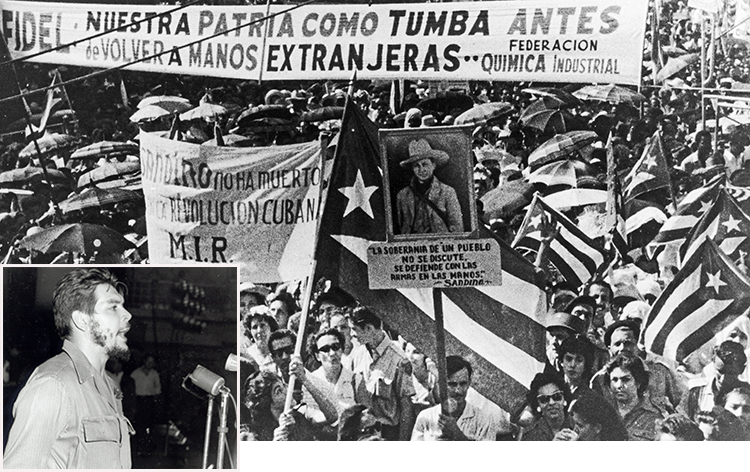
From the Jan. 1, 1959, victory over the Fulgencio Batista dictatorship, the pro-Moscow Stalinist party in Cuba — the Popular Socialist Party — and Stalinist parties around the world had argued that socialist revolution was impossible in Cuba, or elsewhere in Latin America, that the time wasn’t right. Only a bourgeois democratic revolution was possible. They sought to take political leadership out of the hands of Castro and his July 26 co-combatants, and to hold back the revolutionary momentum of Cuban workers and farmers. And to advance the interests of Moscow in maintaining “peaceful coexistence” with Washington.
The SWP championed the revolutionary course advanced by Castro. “We were part of this debate, defending the Cuban Revolution and what it was accomplishing,” said Waters. She explained how Jack Barnes, today national secretary of the Socialist Workers Party, was in Cuba in the summer of 1960, along with thousands of other young people from across the Americas and beyond, taking part as workers and farmers deepened their mobilizations, nationalizing the factories, banks and the land, and making inroads against capitalist social relations.
Barnes took part in the First Latin American Youth Congress in Havana, where the opening session was addressed by Che Guevara. “Is this revolution communist?” Che asked.
“After the usual explanations of what communism is (I leave aside the hackneyed accusations by imperialism and the colonial powers, who confuse everything), I would answer that if this revolution is Marxist — and listen well that I say ‘Marxist’ — it is because it discovered, by its own methods, the road pointed out by Marx. … The Cuban Revolution was moving forward, not worrying about labels, not checking what others said about it, but constantly scrutinizing what the Cuban people wanted of it.”
In April 1961, “Fidel knew the moment had come to put an end to the debate. He knew that the combatants of the Revolutionary Armed Forces, the National Revolutionary Police and the Revolutionary Militias would fight with ever greater courage and determination, understanding what they had already accomplished, what they were fighting to defend,” Waters said. “No socialist revolution is possible without deepening class consciousness, without socialist consciousness. Working people have to be conscious of what we are doing, or we will be defeated.”
Socialist literacy mobilization
The mass literacy campaign — with its roots going back to what was done by the Rebel Army as it conquered territory and took responsibility for organizing life there — was not only about education and culture, she said. It was first and foremost a battle to transform class relations in Cuba. The 100,000 youth from the cities, the majority women and mostly still in their teens, who mobilized to go to the countryside got an education themselves from the rural workers and peasants they were teaching to read and write. “It instilled in that generation a class consciousness that transformed them for life,” Waters said.
In the process, they also made inroads against long-standing prejudices against blacks and women.
Waters contrasted this effort, led as a conscious course to transform social relations, to the important literacy efforts that accompanied many bourgeois revolutions. She pointed to a beautiful painting by Diego Rivera of a solitary teacher educating peasants following the Mexican Revolution of 1910, which is on the front cover of Leon Trotsky’s Art and Revolution published by Pathfinder Press, and compared it to the photos of the mass celebration of tens of thousands of literacy brigadistas in Havana after accomplishing their mission at the end of 1961.
“This was a proletarian campaign,” she stressed.
“The first defeat of U.S. imperialism in this hemisphere took place at the Bay of Pigs. This wasn’t because the U.S. rulers had a bad plan, or chickened out, as the common narrative goes in the U.S.,” Waters said. “It’s because the Cuban workers and farmers won.”
The U.S.-backed forces went down to defeat because “they failed to measure the moral relationship of forces,” Che Guevara said in a speech to electrical workers after the victory. They were “wrong in measuring the fighting capacity of the opposing sides.”
Celebrating three important victories
These three victories we’re celebrating — Cuba’s socialist revolution, Playa Girón and the social conquests registered through the literacy mobilizations — were crucial to forging a working-class vanguard in the United States, then and now. “We in the Socialist Workers Party would not be here without the men and women who did this,” Waters said. “Not because of a thing called the Cuban Revolution, but because of the conscious work of living human beings.”
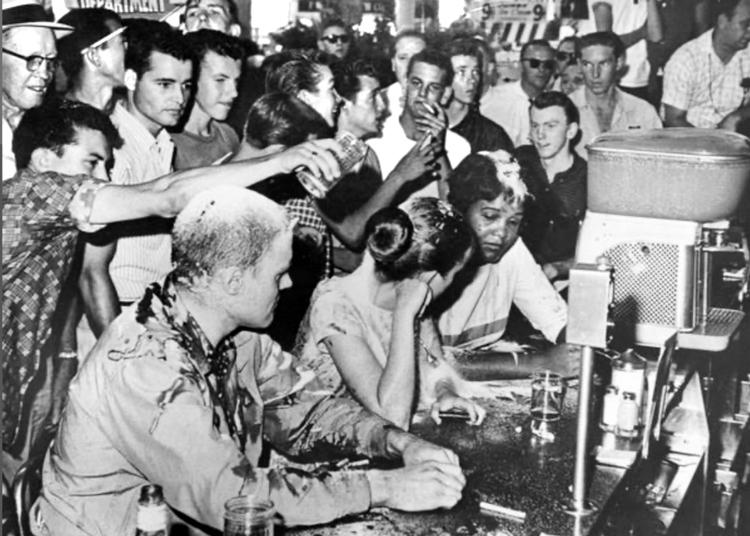
The opening years of the Cuban Revolution coincided with a new wave unfolding in the mass, proletarian-led battle to bring down the apartheid-like system of Jim Crow segregation in the U.S., she said. Building on the victory of the Montgomery bus boycott, the new wave included the Woolworth lunch counter sit-ins, the Freedom Rides, the Freedom Summer, the Selma-Montgomery march, the right-to-vote battles, and much, much more, she said, including the ever clearer revolutionary, international outlook of Malcolm X.
“We saw a mass movement that was advancing in the United States, not proclaiming victimhood but humanity. We identified with Conrado Benitez,” a literacy volunteer murdered by counterrevolutionary forces in Cuba. He was like civil rights fighters who were being brutally murdered here. “We saw the lengths the capitalist rulers would go to maintain their power and property, and more importantly we saw the transformation of ourselves that was needed. The kind of disciplined mass proletarian party that must be built.”
“We were won to the SWP,” she said.
Rights workers have won in struggle
“We learned and continue to learn from the political and moral class stance of the Cuban Revolution,” Waters said. One timely example she pointed to relates to the trial of former Minneapolis cop Derek Chauvin who stands convicted of murdering George Floyd. It was clear from the beginning the ruling class had made a decision to convict Chauvin in hopes of diverting the rising anger against this and so many other cases of police brutality, reflected in the mass protests that broke out across the country last summer. For the rulers, it was the lesser evil.
Prominent attorneys from big private legal firms donated their services to the huge prosecution team arrayed against Chauvin. One police official after another, including the chief of police, testified against him. Chauvin had one attorney. His brother and sister cops didn’t mobilize to stuff the courtroom, as they often do when one of their “blue brothers” has faced trial.
Meanwhile, Democratic Party politicians like Maxine Waters sought to whip up the emotional crowds watching every minute of televised trial and threatened violence if the jurors did not bring in a unanimous murder conviction. Others, including President Joseph Biden, worked to channel the anger into Democratic Party electoral politics and demands to reform the police. One protester captured the lynch mob mentality, saying Chauvin had no right to a trial. “The video is all we need.” It was a mass public spectacle that assaulted rights the working class has won with its blood over centuries — the right to be tried by a jury of your peers, the presumption of innocence until proven guilty, that guilt must be proven beyond a reasonable doubt, and that jury decisions must be unanimous.
“That’s why we don’t join in celebrating this as a wonderful trial and verdict,” Waters said.
In relation to this she said it’s useful to look at one of the more controversial chapters in the opening months of the Cuban Revolution, the trial by revolutionary tribunals of many of Batista’s most notoriously brutal henchmen and the execution of quite a few.
In a book-length interview with French journalist Ignacio Ramonet published in English in 2008 under the title My Life, Castro looked back on these trials. It was an error “that those trials were conducted using public places and allowing the proceedings to be attended by a great number of our countrymen who were justly outraged by the thousands of crimes that had been committed,” Castro said. That “was in conflict with our own ideas of justice. And it was very much exploited by the United States. We lost no time in rectifying what was unquestionably a mistake.”
“We don’t regret having done it,” he said, referring to the establishment of the revolutionary tribunals and holding the trials, “although I do feel pity when I remember how bitter it must have been for [the accused] to experience the hatred that the people quite rightly felt for them because of their repugnant crimes.”
During the revolutionary war the July 26 Movement had explained over and over that when the Batista regime was defeated they “did not want to see people dragged through the streets, or personal vengeance, because justice would be done,” Castro said. “Throughout the entire war, thinking about the mass violence that can accompany the victory of the people, we warned our country about that.”
“This may have been the only revolution in which the main war criminals were tried and brought to justice, the only revolution that didn’t rob or steal, didn’t drag people through the streets, didn’t take revenge, didn’t take justice into its own hands.”
“If there were no lynchings, no bloodbaths it was because of our insistence and our promise: ‘War criminals will be brought to justice and punished.’”
“Cops exist to protect the prerogatives of capital,” Waters said. “They cannot be transformed. Our demand is not ‘reform.’ It’s control and replace.”
When the Batista regime was overthrown, Cuban workers and farmers took over every police station, she said. They disarmed and disbanded Batista’s cops. Some went to trial. The rest were sent home for a month then offered productive jobs. A new national police force was built on a qualitatively different class foundation, drawn from revolutionary combatants.
These police units took the highest casualties fighting at the Bay of Pigs.
Cuban Revolution: our revolution too
“We celebrate and learn from the triumphs — and errors — of the Cuban Revolution,” Waters said. “It’s our revolution too. But for us the challenge is right here.”
In his book Cuba and the Coming American Revolution, Jack Barnes describes how in that summer of 1960 everyone knew the invasion was coming. It was only a question of when. He told a Cuban militia commander he knew and respected that he wanted to stay and help defeat it.
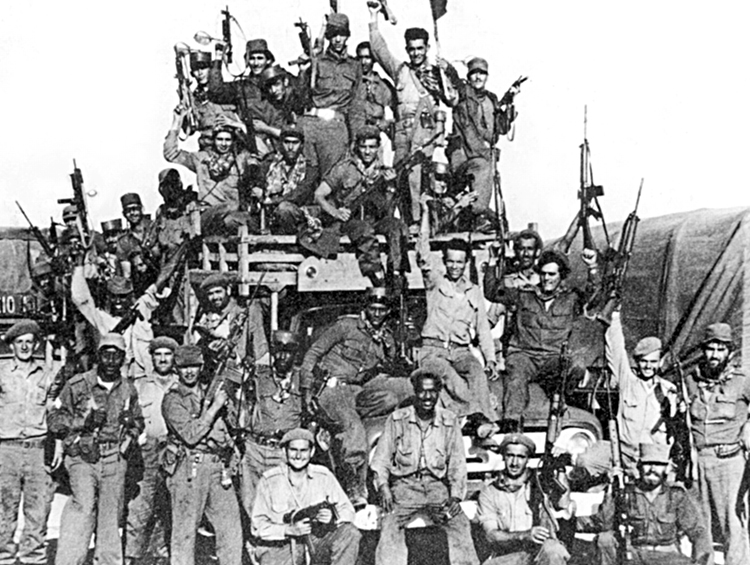
“No. We’ll be ready, and we’ll win,” the commander told Barnes. “Your job is to go back home. To find people like yourself and make a revolution in the U.S. And join a party you’re convinced is on this course.”
“And that’s exactly what he did,” Waters said.
A working discussion
During an hourlong discussion period, participants exchanged recent experiences participating in labor struggles and other working-class fights, talked about some of the political questions posed in the program, and the openings to build a proletarian party today.
Some had just returned from a visit to Brookwood, Alabama, to support the coal miners strike against Warrior Met Coal.
Maggie Trowe, SWP candidate for mayor of Louisville, was part of the visit to Brookwood. She encouraged people to join in building solidarity with the miners’ fight, and to join in campaigning with the Socialist Workers Party. “It’s a real way to engage in discussion, including on the strike and on the example of what working people did in Cuba,” she said. “And what they are doing today, setting an example of international solidarity” in response to the pandemic.
“I got to know the party six months ago and am glad to be here,” said Dave Perry from Cincinnati. He described the fight for safer conditions and dignity on the job at the factory where he works. Like many workers there he is blind. “It doesn’t matter if you’re blind or sighted, no matter what your disability, race or background, it’s going to take a fight to change anything,” he said.
Ilona Gersh from Chicago said that campaigning in both Minneapolis and Chicago, she had met workers who equated mass protests with the looting and violence in the wake of the killing of George Floyd. She said she responded by pointing to the need to broaden working-class mobilizations, including fighting to involve our unions, to counter these anti-working-class actions and bring to bear the strength and class clarity of working people.
Experiences in Minneapolis
“Our experiences in Minneapolis over the last year have opened possibilities for strengthening the communist movement, for gaining new recruits, contacts and co-fighters,” said SWP mayoral candidate Doug Nelson. “This includes participation in mass protests against police brutality and, more recently, solidarity with the Marathon oil workers and health care workers organizing to resist attacks on their wages and working conditions.”
He described the mass outpouring last year in response to the killing of Floyd, the moral outrage that had been brewing for years, and the discussions he took part in as the protests unfolded about how to contend with the anarchists, some misleaders of Black Lives Matter, and others who looted and burned stores, demobilizing the mass protests.
Following the recent police killing of Daunte Wright in Brooklyn Center, near Minneapolis, Nelson said, City Manager Curt Boganey was fired simply for saying, all city employees “are entitled to due process.” (See accompanying excerpt from Nelson’s remarks.)
Nelson said the participation of Teamsters Local 120 and a statement by the Minnesota Nurses Association in solidarity with protests against the killing of Wright “is a good development,” one that points to the class forces needed to advance.
The involvement of the unions in this kind of social struggle is also an important step toward beginning to transform them into instruments that fight broadly for the interests of the working class as a whole, Waters pointed out.
Joe Swanson spoke about the experiences during his campaign for Lincoln City Council. He explained how he worked on the railroad for decades and was active in his union, “but I didn’t find the kind of leadership that was needed until I met the party.”
“Our next project is to try to organize a car caravan in Lincoln against the U.S. economic war on Cuba,” Swanson added. Many of those at the meeting have been involved in building the growing number of monthly car and bike caravans demanding an end to the U.S. rulers’ economic war against Cuba. Dan Fein urged everyone to attend the caravan taking place the following day in Chicago. “This is a way to have a public demonstration, not a Zoom meeting,” he said.
Waters and a number of meeting participants joined the Chicago caravan, and Waters said a few words at its opening.
‘Our job is to prepare’
“We know that big class struggles are coming, but we have no control over when and how they’re going to start,” Waters said in her summary remarks. “That is determined by social and economic factors on the broadest level. Our job is to be prepared — to understand and be able to draw on the real history of the class struggle, in the United States and internationally.
“The experiences comrades described, in many different places, are all part of that preparation,” she said. “This includes reading and studying, collectively, discussing and debating and clarifying our understanding.”
We know that only the working class as an organized force can change the course of these struggles, Waters said. “That’s why the example of the class forces that actually brought down Jim Crow are so important. It is a history that’s not known, it’s not taught in school.” What communists bring into the skirmishes today is that understanding of a class perspective, contributing to the development of leadership as workers go through class-struggle experiences.
“We’re very aware of the social and economic crisis of capitalism and the way that has been accelerated over the last year by the rulers’ response to the COVID pandemic,” she said. The attempt to simply lock down huge sections of society is a factor in some of the struggles that break out today, as workers resist all the pressures that have come down on our class.
Participants left the meeting with plans to join up and campaign for Swanson the following weekend in Lincoln, before the May 4 City Council election there. And join campaign supporters in Minneapolis to put Nelson on the ballot for mayor.
